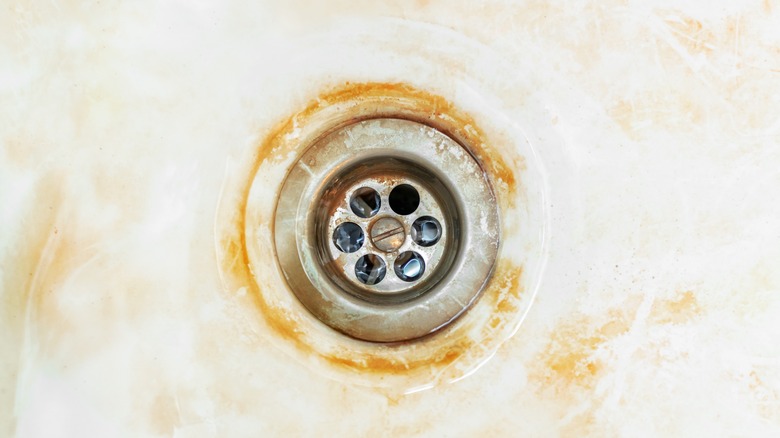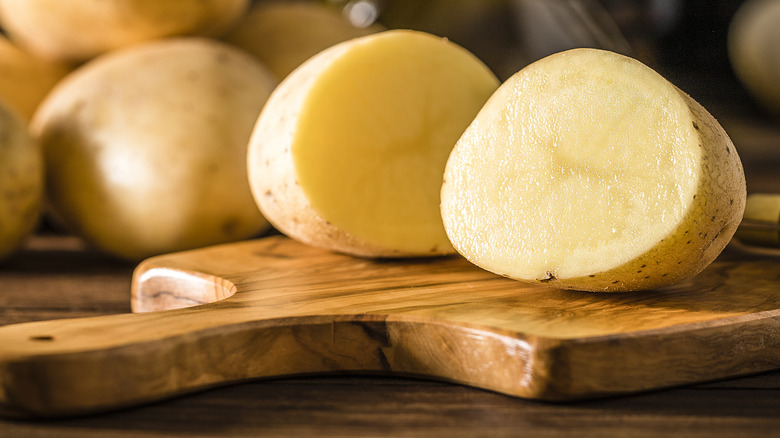Easily Remove Bathtub Rust With This Common Kitchen Pantry Ingredient
Luxuriating in a warm bath is a cherished pastime, but the discovery of rust stains in your bathtub can turn relaxation into frustration. Over time, many tubs fall victim to this unwelcome phenomenon due mainly to exposure to moisture. Rust accumulation is a common woe, especially in regions with hard water or when abrasive cleaners are used frequently. Rust is not only unsightly but also detracts from your tub's aesthetic appeal. More importantly, it can also lead to structural damage if left unattended, and reduce the functional lifespan of your tub. While there are numerous rust-removal products available, there's an unexpected hero you might have right in your kitchen — the humble potato.
We're all familiar with the potato, a kitchen staple that's more than just a versatile food. Surprisingly, this earthy spud can come to the rescue when you want to banish those pesky rust stains. Learn how a potato, combined with a bit of knowhow, can be an effective and eco-friendly solution for rust removal and restore your bathtub's sparkle.
The rust-busting potato technique
Now that we've identified the unlikely hero, let's delve into the practical steps of using a potato for rust removal. Begin by slicing the potato in half and dipping the cut side into a mild abrasive like baking soda or salt. Rub the potato onto the rusted areas, applying a bit of pressure. If the sliced side starts feeling a tad slippery, just slice it again, and repeat the procedure until the rust is completely gone. You may also use dish soap as an alternative to salt and baking soda. Just apply the soap to the cut side of the potato and let it sit on the rust for two hours before rinsing away (repeat as needed).
But why does this method work? One simple explanation is that potatoes contain high levels of oxalic acid. In turn, oxalic acid, according to Encyclopedia Brittanica, is widely used as a rust and ink stain removal agent. It forms a gentle yet effective chelating reaction with the rust, loosening its grip on the surface.
Besides their role in rust removal, potatoes — specifically potato peels and their extract containing phenolic acid and compounds — have been the subject of study as corrosion inhibitors, as evidenced in one 2014 report published in ResearchGate and a 2020 study presented in the International Journal of Advanced Research and Publications (IJARP). This means that potato peels could one day become a primary resource for the production of eco-friendly corrosion inhibitor products.
Tub TLC -- preventing rust and ensuring longevity
While the potato cleaning method is a game-changer for rust removal, proactive care can save you from this headache altogether. Regularly clean your bathtub with mild, non-abrasive cleaners to prevent rust formation. Promptly fix any leaks to minimize water exposure, as standing water is a catalyst for rust formation. If you can make a habit of it, wipe down your tub after every use. Additionally, invest in a shower curtain or screen to prevent splashes and keep the immediate environment dry. Remember, a little love and attention go a long way in maintaining the luster of your bathtub and ensuring a rust-free haven for your relaxation rituals.
As for those spuds we all love so much in our appetizers, salads, and casseroles, it's time to give them the recognition they deserve beyond the kitchen and dining table. Their roles as powerful corrosion inhibitors and rust-fighters make them outstanding allies in the realm of cleaning, so it's smart to have a few extra potatoes on standby for rust-related emergencies.


